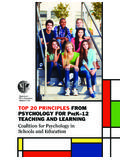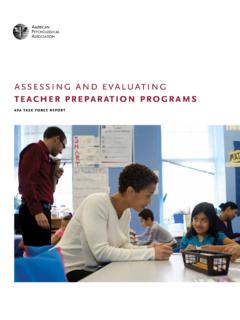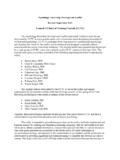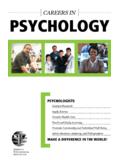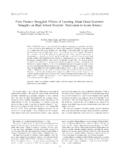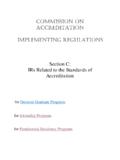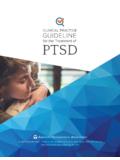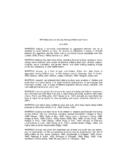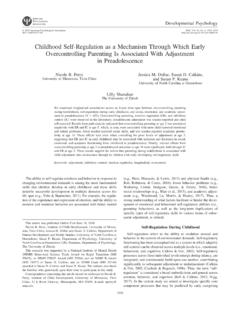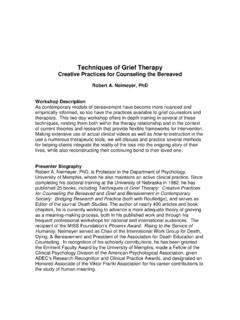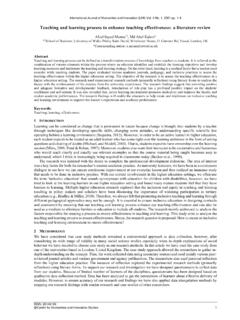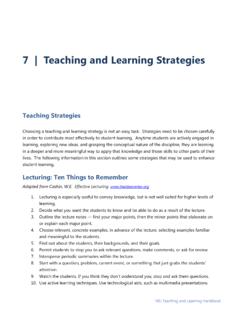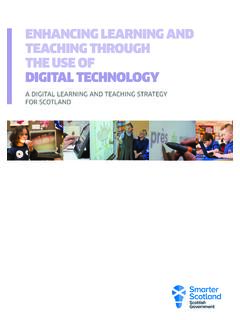Transcription of re TEACHING AND LEARNING
1 TOP 20 PRINCIPLES FROM. PSYCHOLOGY FOR PreK 12. TEACHING AND LEARNING . Coalition for Psychology in Schools and Education Top 20 Principles From Psychology for PreK 12 TEACHING and LEARNING Coalition for Psychology Thanks to the following members and former in Schools and Education members of the Coalition for Psychology in Schools and Education and supporters for their contributions Contributing Authors as reviewers: Joan Lucariello, PhD (Chair). Sandra Graham, PhD Larry Alferink, PhD James Mahalik, PhD. Bonnie Nastasi, PhD Eric Anderman, PhD Rob McEntarffer, PhD.
2 Carol Dwyer, PhD Joshua Aronson, PhD John Murray, PhD. Russ Skiba, PhD Cynthia Belar, PhD Sam Ortiz, PhD. Jonathan Plucker, PhD Hardin Coleman, PhD Isaac Prilleltensky, PhD. Mary Pitoniak, PhD Jane Conoley, PhD Yadira Sanchez, PsyD. Mary Brabeck, PhD Tim Curby, PhD Peter Sheras, PhD. Darlene DeMarie, PhD Robyn Hess, PhD Gary Stoner, PhD. Steven Pritzker, PhD Randy Kamphaus, PhD Adam Winsler, PhD. Jason Young, PhD. APA Staff Liaison Rena Subotnik, PhD. Geesoo Maie Lee Printed copies are available from: Suggested bibliographic reference: Center for Psychology in Schools and Education American Psychological Association, Coalition for Psychology in Education Directorate Schools and Education.
3 (2015). Top 20 principles from psychol- American Psychological Association ogy for preK 12 TEACHING and LEARNING . Retrieved from http://. 750 First Street, NE Washington, DC 20002-4242. Copyright 2015 by the American Psychological Association. 202-336-5923. This material may be reproduced and distributed without Email: permission provided that acknowledgment is given to the American Psychological Association. This material may not A copy of this report is available online at be reprinted, translated, or distributed electronically without prior permission in writing from the publisher.
4 For permis- sion, contact APA, Rights and Permissions, 750 First Street, NE, Washington, DC 20002-4242. APA reports synthesize current psychological knowledge in a given area and may offer recommendations for future action. They do not constitute APA policy nor commit APA to the activities described therein. This particular report originated with the Coalition for Psychology in Schools and Education, an APA-sponsored group of psychologists representing APA. divisions and affiliated groups. ii Contents Top 20 Principles From Psychology for PreK 12 TEACHING and 1.
5 3. 4. Top 20 6. How Do Students Think and Learn? Principles 1 6. What Motivates Students? Principles 9 16. Why Are Social Context, Interpersonal Relationships, and Emotional Well-Being Important to Student LEARNING ? Principles 13 21. How Can the Classroom Best Be Managed? Principles 16 25. How to Assess Student Progress? Principles 18 Top 20 Principles From Psychology for PreK 12 TEACHING and LEARNING Principle 1 Students'. beliefs or perceptions about Principle 12 S. etting goals that are short term intelligence and ability affect their cognitive (proximal), specific, and moderately functioning and LEARNING .
6 Challenging enhances motivation more than establishing goals that are long term Principle 2 W. hat students already know affects their (distal), general, and overly challenging. LEARNING . Principle 13 L earning is situated within multiple social Principle 3 S. tudents' cognitive development and contexts. LEARNING are not limited by general stages of development. Principle 14 I nterpersonal relationships and commu- nication are critical to both the TEACHING . Principle 4 LEARNING is based on context, so generalizing LEARNING process and the social-emotional LEARNING to new contexts is not spontaneous development of students.
7 But instead needs to be facilitated. Principle 15 E. motional well-being influences Principle 5 A. cquiring long-term knowledge and skill is educational performance, LEARNING , largely dependent on practice. and development. Principle 6 C. lear, explanatory, and timely feedback to Principle 16 E. xpectations for classroom conduct and students is important for LEARNING . social interaction are learned and can be taught using proven principles of behavior Principle 7 S. tudents' self-regulation assists LEARNING , and effective classroom instruction.
8 And self-regulatory skills can be taught. Principle 17 E. ffective classroom management Principle 8 Student creativity can be fostered. is based on (a) setting and communicating high expectations, (b) consistently nurtur- Principle 9 S. tudents tend to enjoy LEARNING and perform ing positive relationships, and (c) providing better when they are more intrinsically than a high level of student support. extrinsically motivated to achieve. Principle 18 F. ormative and summative assessments Principle 10 Students persist in the face of challenging are both important and useful but require tasks and process information more deeply different approaches and interpretations.
9 When they adopt mastery goals rather than performance goals. Principle 19 S. tudents' skills, knowledge, and abilities are best measured with assessment Principle 11 Teachers' expectations about their processes grounded in psychological students affect students' opportunities science with well-defined standards for to learn, their motivation, and their quality and fairness. LEARNING outcomes. Principle 20 M. aking sense of assessment data depends on clear, appropriate, and fair interpretation. Introduction Psychological science has much to contribute to enhancing TEACHING and learn- ing in the classroom.
10 TEACHING and LEARNING are intricately linked to social and behavioral factors of human development, including cognition, motivation, social interaction, and communication. Psychological science can also provide key insights on effective instruction, classroom environments that promote LEARNING , and appropriate use of assessment, including data, tests, and mea- surement, as well as research methods that inform practice. We present here the most important principles from psychology the Top 20 that would be of greatest use in the context of preK 12 classroom TEACHING and LEARNING , as well as the implications of each as applied to classroom practice.
